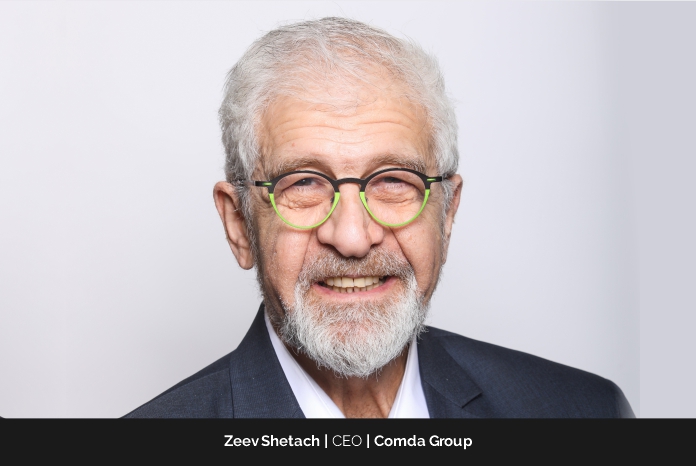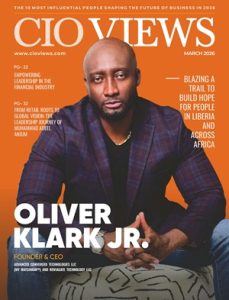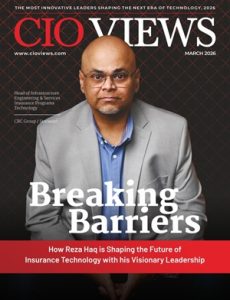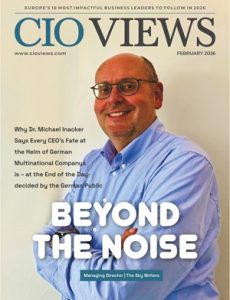In 1985, a young man had the foresight to recognize that as the world became increasingly connected, the real challenge would be building systems that hinged on trust. He set out to shape the foundations of digital security and trust long before they became an imperative. That young man was Zeev Shetach, a pioneer in the truest sense. After 40 years, he, now as CEO of Comda group, the parent company that founded ComSign and ComsignTrust, continues to anticipate, create developments and introduce groundbreaking solutions.
For Zeev, his greatest achievement is being trusted by the Israeli community, institutes, the healthcare insurance organizations and the financial institutes, as well as being trusted by the government and companies such as Microsoft and Adobe. “We have to maintain this because the need for trust will only increase in the future. Nobody trusts anyone today,” Zeev says. “And you need to have some organization that can verify: Can I trust this person? Is this real?” He says that they are like an island of trust in the world.
The Beginning in 1985
If one had to track Zeev’s journey in cybersecurity, it would not be a straight line. And, according to him, it was a path paved with fascination for solving complex problems.
In 1985, long before digital innovation entered the common lexicon, Zeev founded COMDA, a leading provider of authentication and digital signature software systems. When Zeev began to realize that their world was becoming more and more connected through the TCP/IP protocol, he knew that the “very nature of trust would have to be redesigned.”
“I saw that the future of business, as well as society, would depend not just on building communications, but also on building systems that could be fundamentally trusted,” he says. He viewed this less as a business opportunity and more as an engineering and philosophical challenge. He found that captivating.
And Zeev’s entrepreneurial drive stemmed from his desire to build solutions and create a large team in Israel that could tackle these foundational problems head-on.
Founding of ComSign
Today, ComSign is the largest certificate authority (CA) for issuing digital signatures in Israel. In 1999, It was born out of necessity and foresight, Zeev says. By the late 1990s, the internet was beginning to reshape commerce, and soon, it became clear to Zeev and others that the digital world needed the equivalent of a handwritten signature and a sealed envelope. In 2001, Israel passed the Electronics Signature Law. Zeev was among the creators of this law in the Israeli Parliament.
According to him, there was an immense gap in the market for a trusted, legally recognized entity that could provide digital certificates. ComSign filled this gap.
“My vision for ComSign was twofold,” Zeev says. First, he wanted it to become the de facto standard for digital trust in Israel that businesses and citizens could rely on without a doubt. They achieved this when they were officially recognized by the Ministry of Justice as a Qualified Certificate Authority.
Second, Zeev envisioned a future where digital processes were inherently more secure and efficient than their paper-based counterparts. “The goal was never just to replace paper,” he says. “It was to build a solid ground of trust for the new digital economy.” With ComSign, he was able to accomplish this as well.
Dealing with Challenges
Zeev faced his most transformative challenge during the transition from selling data communications products to providing intangible, trust-based digital services. Earlier, customers would receive tangible tokens. But digital services are intangible. So, the questions that Zeev grappled with were, “how to sell ‘trust’?” or “how to explain a digital certificate’s value or a PKI infrastructure to someone who has only known paper contracts and physical keys?” This challenge forced him to evolve as a leader. Along with being a technologist, he became an excellent educator and storyteller. According to Zeev, he learned to translate complex cryptography into tangible business benefits, such as risk reduction, operational efficiency, and legal certainty.
“It shaped my leadership by cementing a core philosophy: Our job is to create the security confidence needed for the business IT infrastructure,” he says.
Also, when Zeev began talking about the new TCP/IP protocol in the 80’s of the previous century, no one took him seriously, it was a time when the tech world spoke almost exclusively in the language of giants like IBM, DEC, and Microsoft. “People didn’t want to listen to a young person like me,” recalls Zeev, who was 30 years old at the time. He was telling a different story from that of the big companies. Despite receiving lukewarm response, Zeev didn’t give up.
Gradually, big organizations began to understand what he was trying to say about the new era and the new network. Then the internet boomed, which made them appreciate him even more. They also began implementing the TCP/IP protocol inside their organizations. Zeev remembers that it took him a long time to convince these companies and educate them.
“The hard work was actually to make people understand what they were facing and what kind of future they were about to step into, and educate them to take the right steps so that they and their organizations would not fail during this process,” Zeev says.
Today, in Israel, there is no medium or large organization that is not a customer of the company.
The Most Defining Moment
Over the last 40 years, Zeev has achieved many significant milestones. For him, however, the one that stands out is their recognition as a Qualified Trust Service Provider (QTSP) under the European eIDAS regulation. “This was a defining moment because it validated our vision on an international stage,” Zeev says. He was also proud that an Israeli company had met the most stringent digital trust standard.
This recognition also proved that their commitment to security, quality, and forward-thinking was world-class, which opened the door for their European expansion. According to Zeev, it also solidified their position as a global authority on digital trust.
The Ethical Foundation
Zeev points out that their entire business is built on an ethical foundation. As a Certifying Authority, ComSign is the arbiters of digital truth, which according to Zeev is an immense responsibility. Therefore, three core principles guide every decision of theirs.
The first core principle is “privacy by design.” Zeev and his team build their systems with the assumption that protecting user data is paramount. “We don’t just comply with regulations like GDPR,” he says. “We embrace their spirit.”
“Unwavering integrity” is the second core principle. They make sure to never compromise on their verification processes. “There are no shortcuts,” Zeev says. He and his team understand that the moment they compromise, the entire digital ecosystem they support will be eroded.
The third principle that Zeev and his team adhere to is “responsibility for the future.” They believe they have an ethical obligation to protect their clients not just from the threats of today, but from the threats of tomorrow. “We feel responsible,” Zeev says. “Our investment in post-quantum cryptography is a direct result of this principle.”
What Is Innovation?
Zeev does not chase the latest trends, nor does he view innovation as a way to make money. For him, innovation is about anticipating the next fundamental shift and building the tools to solve real problems. And innovation is about solving problems that customers may not even realize they have yet, according to him. For example, they are not just reacting to the threat of AI-driven fraud, but also building systems. These systems are being developed on the premise that, in the near future, one will not be able to trust what they see or hear. “Our solution of multi-factor authentication is a direct response to this threatening future,” Zeev says.
Changing Landscape of Technology and Innovation
About 40 years ago, when Zeev started his company, it was considered a brave move to launch a startup. And he did it without any financing. He had to use his salary. Today, it is a different scenario. The young generation, aspiring entrepreneurs in their 20s and 30s, raise money when they want to start their own companies.
“Also, today’s generation doesn’t want to be employees,” Zeev notes. “They want to run their own businesses. Today, this is very common, whereas 40 years ago, it was not.” According to him, in his generation, he was probably the only one who didn’t want to be an employee in a larger company in Israel, as he felt he would not fit in.
“I realized in those early days that I thrive outside traditional companies’ structures, so I chose to become self-employed and build my own path,” Zeev says. But today, many people are starting startups, even though only a few succeed.
“The generation has definitely changed,” Zeev says.
The Diary of a CEO
Zeev’s daily focus is on three core pillars. One of them is vision and strategy. He spends a significant amount of time looking beyond the immediate horizon and trying to determine what the threat landscape will look like in five years. For example, are they, as a nation and its large organizations, prepared for the post-quantum era? Or are their AI defenses robust enough? Zeev points out that his job is to ask these questions and ensure their R&D is aligned with the future.
The second core pillar is the team. Zeev’s focus is on ensuring that their team has the resources, the motivation, and the culture to excel. “This means listening to them, removing obstacles, and fostering an environment of collaboration,” he says.
Strategic customers make up their third core pillar. He is responsible for maintaining personal relationships with key clients. According to Zeev, their most valuable market research comes from understanding clients’ evolving challenges firsthand. “It ensures our solutions remain not just relevant, but essential,” he says.
Zeev arrives at work around 8 a.m., and he usually starts his day by holding meetings with customers and partners. Every six months, he also invites each employee for a personal meeting. “The employees like it very much,” Zeev says. He enjoys it too, because it helps him understand what is happening in the field. During these meetings, he also asks about an employee’s family and any challenges they may be facing, and if there is an issue, he tries to help. Zeev goes the extra mile with each employee.
Zeev feels a sense of success when the company is successful. However, according to him, this success means nothing without the company’s employees. He also points out that true success comes from customers’ reactions, which show their satisfaction with the company’s leadership in the area of digital identities.
Work-Life Integration
Zeev points out that after nearly four decades of leading this company, the line between personal and professional can certainly blur. “For me, the key is integration, not separation,” he says.
He considers work a significant part of his life’s passion, not just a job. He maintains a balance between his work and personal life by being fully present in whatever he is doing. “When I am with my family, I am with them completely,” he says. “When I am focused on a strategic challenge for the company, it has my full attention.”
Zeev also believes in building a team he can trust implicitly. He points out that he is fortunate to have a leadership team that is incredibly capable and dedicated. “That allows me the space to disconnect and recharge, knowing the company is in excellent hands,” Zeev says.
Passing on a Lesson from His Journey
If Zeev had to pass on one lesson from his leadership journey to the next generation of CEOs, it would be: “Build your company like you’re building a bridge, not a skyscraper.”
He explains that a skyscraper is designed to reach impressive heights quickly, and its success is measured by its peak. A bridge, on the other hand, is designed for resilience, longevity, and to connect two points, creating value by enabling passage. And it must be designed to withstand storms and stresses one can’t even predict. Zeev also points out, “A bridge has to be strong and trusted, first of all, otherwise people won’t use it.”
He encourages the next generation to focus on building a resilient foundation of trust with their customers and team, in addition to obsessing over the quality of their connections, not just the height of their quarterly earnings. “If you build a strong, trustworthy bridge, the traffic and the success will come, and it will endure for decades,” Zeev says.
And he advises aspiring leaders to keep learning. According to him, as the threat landscape evolves daily, they must continuously adapt and grow in response to these changes. “The moment you think you’re an expert in cybersecurity is the moment you become vulnerable,” points out Zeev.
Building Infrastructure of Trust
“I believe our work is foundational,” Zeev says. “We are building the rails upon which a truly secure digital society can run.”
He points out that when future generations conduct business, receive medical care, or interact with their government online, they will do so on an infrastructure of trust that they are helping build today. Zeev and his team are contributing to ensure that “digital identity” does not become a vulnerability. They are focused on making it a secure, verifiable, and empowering asset for every individual and organization.
“By championing standards like eIDAS and preparing for the quantum threat now,” Zeev says, “we are ensuring that the digital world our children and grandchildren inherit is one where trust is a given naturally.”





